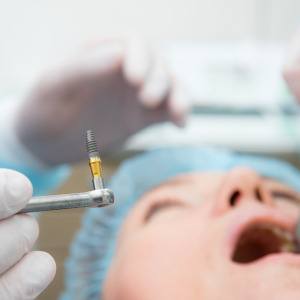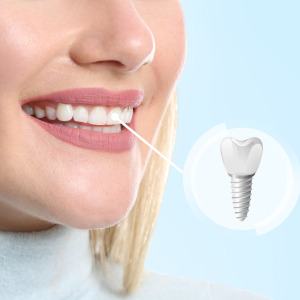Our dental office is less than five minutes west of the intersection of I-30 and 360, just north of Hurricane Harbor and Six Flags. We’re also only minutes away from Peach Elementary and Nicholas Junior High School.
Dental Implants – Arlington, TX
The Ultimate Missing Teeth Solution
When it comes to aesthetics, strength, and longevity, the next best thing to your natural teeth is dental implants, making them an ideal option for patients missing one, several, or even all of their teeth. Other dental offices require their implant patients to see outside specialists for this procedure, but we have an in-house expert, Dr. Deepti Namineni, who can perform each stage under our roof, saving you time and stress. Are you ready to have your full smile back? If so, call today to learn more.
Why Choose Sonria Dentista of Arlington for Dental Implants?
- Beginning to End Dental Implant Care
- In-House Dental Implant Expert
- Low-to-No Interest Financing Available
What Are Dental Implants?

Dental implants are artificial tooth roots made of biocompatible materials, such as titanium or zirconia, that are surgically placed into the jawbone to support a replacement tooth, bridge, or denture. They offer a permanent and stable solution for missing teeth, improving oral health and overall quality of life. Dental implants are custom-made to match the color, shape, and size of natural teeth, providing a natural-looking and functional result. They also stimulate the jawbone, preventing bone loss and preserving facial structure. With proper care and maintenance, dental implants can last for many years.
The 4-Step Dental Implant Process

The average dental implant treatment timeline can take anywhere from six months to a year, depending on a variety of factors, like whether you require preparatory treatments, for example. Our goal is to make your journey as seamless as possible, which is why our expert implant dentist has completed advanced training to do the entire procedure in-house, so no referrals will be needed! Below, we’ve outlined the four basic steps of getting dental implants so you have a better understanding of what to expect from the process. However, the best way to learn what your unique journey will look like is to schedule a consultation with us!
The Initial Consultation

Every dental implant treatment begins with an in-depth consultation with Dr. Deepti Namineni. During your visit, you’ll have a chance to speak with her about your expectations, smile goals, and all of your tooth replacement options.
Our team at Sonria Dentista of Arlington will also collect any necessary diagnostic information, like a scan of your facial structure with our cone beam CT scanner. This will allow us to determine whether any preliminary treatments are necessary, like a bone graft. In some cases, you may need to undergo additional procedures before you can successfully have your dental implants placed.
Dental Implant Placement

After Dr. Namineni has outlined your treatment plan with you and answered any lingering questions you may have, you’ll be able to choose whether you want to move forward with the next step, dental implant surgery. If so, our team will schedule your procedure for you. Due to Dr. Namineni’s extensive experience and training, she will be able to complete this part of the process in-house, eliminating the need for a referral to another office.
During the surgery, Dr. Namineni will make small windows in the gums to secure the dental implants within the jawbone. When finished, she will stitch the gums closed to allow them to heal around the implants.
Osseointegration & Abutment Attachment

For the following three to six months after your surgery, you’ll heal. During this time, your dental implants will also fuse with your jawbone through a process called osseointegration. This step is critical for the long-term success of your dental implants and restoration, so our team wants to make sure that this natural healing and fusion process is successful.
Once osseointegration is complete, you’ll return to our office for a minimally invasive abutment placement procedure. Abutments are small metal connector pieces that are attached to the tops of your implants that will be responsible for anchoring your prosthetic within your mouth.
Securing the Final Restorations

The final step of your procedure will be to complete your smile! When our team has received your custom-crafted dental crown, bridge, or denture from our dental laboratory and your gums have healed around your abutments, we’ll call you back into the office. We’ll make sure that the restorations match your natural tooth color and ensure they fit perfectly before attaching them to your abutments and completing your grin.
Benefits of Dental Implants

With so many tooth-replacement solutions to choose from, you might be wondering why dental implants are so popular. Well, there are several reasons! At your consultation, we will determine if you’re a candidate and, if you are, why dental implants are worth the investment. Of course, you’re also welcome to learn a bit more on the topic by reading on as well!
Day-to-Day Benefits

Like many other patients, you might not have truly realized how important healthy teeth are until they are gone. The good news is that dental implants are the next best thing, which means they can improve your overall quality of life. To be more specific, here are a few day-to-day benefits that you’ll enjoy with this state-of-the-art tooth-replacement solution:
- Easier Maintenance: While other tooth-replacement solutions require special oral hygiene products, like denture cleaner, dental implants don’t. In fact, you can use all of the same products you use to clean your natural teeth (i.e., soft-bristled toothbrush, fluoridated toothpaste, antimicrobial mouthwash).
- Increased Confidence: If you’ve had dentures in the past that didn’t fit quite right, they might have slipped at inopportune moments, like when talking to a friend. You won’t have to worry about that with dental implants because they don’t compromise on look or stability!
- Ability to Eat Most Foods: While tooth loss limits your diet, dental implants expand it! Once you’ve healed, you’ll be able to enjoy a wide variety of foods, which helps prevent everything from malnutrition to boring meals.
Health Benefits

In addition to improving your day-to-day life, dental implants can improve your oral and overall health. A few examples include:
- Jawbone Preservation: Unlike traditional dental bridges and dentures, implant-supported teeth are rooted in the jawbone. This not only makes them extremely stable and secure, but it also saves the gums from experiencing constant pressure during chewing which can lead to soreness and infection.
- Protection for Natural Teeth: Some tooth-replacement solutions require the teeth surrounding the gap to be altered, even if they are completely healthy. Not dental implants! Since they are self-supporting, they can replace a single tooth or multiple teeth throughout your mouth while leaving your natural ones perfectly intact.
- Better Overall Health: Tooth loss can lead to several unwanted consequences, including trouble chewing, restricted diets, and malnutrition. Since dental implants replace the root and crown of the tooth, they restore your bite power and, in turn, improve your overall health.
Long-Term Benefits

Perhaps one of the biggest reasons roughly 500,000 patients a year choose dental implants is because of the long-term benefits they offer, including:
- High Success Rate: Dental implants have an unheard-of 95% success rate, and some studies have found that number is even higher among non-smoking patients.
- Youthful Appearance: In addition to preventing bone loss, dental implants fill out your smile, preventing your cheeks from looking sunken in.
- Long-Lasting Results: Dental implants have been shown to last for 25+ years with routine care, which is multiple times longer compared to other prosthetics that typically need to be replaced every 5-10 years.
Who Dental Implants Can Help
Dental implants can help anyone with one or more missing teeth. They are a great option for those who cannot or do not want to wear dentures as well as individuals who want to improve their oral health and smile. Dental implants may also be recommended for people with jawbone loss or other oral health issues.
Missing One Tooth

The idea is simple: a single dental implant is placed into the jaw, and then it is topped with a custom-made crown that is designed and shaded to perfectly match the surrounding teeth.
Missing Multiple Teeth

Rather than connecting a bridge to natural teeth, two implants can be used to support up to four consecutive replacement teeth. Multiple implants can be positioned along one of the jaws and serve as the foundation of a partial denture as well.
Missing All of Your Teeth

Instead of relying on natural suction or metal clips to stay in place, implant dentures are rooted to the jawbone just like real teeth. It typically takes just four to six implants to restore an entire row, after which a patient won’t have to worry about taking their prosthetic out to clean it.
Understanding the Cost of Dental Implants

Before you commit to dental implants, you may want to learn their price. That’s only fair – the posts won’t do much good if they exceed your budget. However, the cost of dental implants varies by patient; it can rise or fall for different people. You’ll need to consult Dr. Namineni for a precise estimate that accounts for your treatment’s specifics. From there, our team will walk you through ways to make your care more affordable. Please keep reading or call our office to learn more.
Preliminary Treatments & Dental Implant Surgery

Based on your case, you may need other services before dental implant surgery. These extra procedures can range from gum disease treatment to tooth extractions or even bone grafts. They’d add to your expenses but also further ensure your implants’ success. The bright side is that most are partly covered by dental insurance.
Of course, your dental implant surgery will also incur its own cost. Its price will largely depend on what (if any) anesthesia is used, implant location, and similar matters. Thankfully, we provide the entire surgery in-house; you won’t have to worry about working with an outside surgeon.
The Parts of Your Dental Implant

In the end, even your dental implant’s parts will impact its final cost. The most notable of these include:
- Implant Number – In general, treatment costs more when it involves more implants.
- Material Used – Most dental implants use titanium, but not all of them. Some are made of zirconia and cost more as a result.
- Implant Brand – An implant’s brand will partly affect its cost. Since different providers cater to distinct needs, each one charges its own price.
- Restoration Type – The reality is that dental crowns, bridges, and dentures have differing costs. Often, the less expensive of these restorations are the smaller ones.
How Dental Implants Pay for Themselves

Initially, you may think dentures and dental bridges cost less than dental implants. The first two choices have a lower upfront price than the “gold standard” option. Still, dental implants really are the more cost-effective treatment in the long run.
You see, dental implants tend to have very long lifespans; they can last for 30 years or more with good care. That means they often don’t need replacement or adjustment visits every few years. As a result, implants won’t force you to pay for adhesives or pastes to keep them functional. You can care for them like natural teeth and save money otherwise spent on follow-up care.
Does My Dental Insurance Cover Dental Implants?

Dental insurance rarely ever covers dental implants, though there are rare cases. Your own plan may offer coverage for part of your treatment – a percentage of your restoration, a preliminary service, etc. Given this fact, please consult your insurance provider before you commit to anything. We at Sonria Dentista of Arlington will gladly help you do so.
Making Dental Implants Affordable

If you lack dental insurance, don’t worry; dental implants can still be affordable. All you need to do is try one of our office’s helpful payment options! In particular, we offer a flexible financing program with CareCredit – a reputable 3rd party financier. They would let you pay for implants in monthly installments with little or no interest attached.
As you can see, our dental implants don’t have to “break the bank.” To ensure they fit your budget, just visit our office for a consultation.
Dental Implants Post-Op Instructions

Dental implants are highly effective, but you'll need to recover after you get them. Your mouth won’t just heal right after the placement surgery, right? The silver lining is that our practice can give you dental implant post-op instructions to follow. By using these special tips, you can heal more smoothly and enjoy your new teeth without worries. Learn about them in detail by reading below, or call us to hear more over the phone!
What to Do Directly After Dental Implant Surgery

When your dental implants are placed, you need to leave the forming blood clot alone. Touching or poking it would only delay (or reverse) your recovery. So, please remember to:
- Keep your fingers and tongue away from the surgical site(s) for a few days
- Not spit and instead (if necessary) swallow your saliva or use a tissue for dabbing
- Avoid using tobacco products in the first 24 hours after surgery
- Not use drinking straws for a while, as suction force can dislodge a blood clot
Common Side Effects When Recovering from Dental Implant Placement

You’ll likely endure some mild side effects soon after dental implant placement. The most common ones include:
- Mouth-Related Discomfort – Your treatment site may ache once the surgery’s anesthesia wears off. At that point, use some store-bought pain relievers to ease your soreness.
- Facial or Gum Swelling – 72 hours after implant surgery, your face or gums could swell a bit. Please apply a cold compress if that happens.
- Intermittent Bleeding – It’s common for the treatment site to bleed slightly after placement. To lessen this effect, both gauze and light pressure should be applied.
Rest assured that the above effects are temporary; they’ll subside after a few days. If they don’t or get worse, please contact us.
Your Diet After Dental Implant Surgery

You should follow a soft food diet after your dental implant surgery. While healing, chewing a tough meal would dislodge your blood clot and delay recovery.
As part of your soft food diet, you could have:
- (Non-hot) Soup
- Pasta
- Pudding
- Sweet Potatoes
- Scrambled Eggs
- Yogurt
- Soft Cheese
- Smoothies
- Mashed Potatoes
- Ice Cream
You should be ready to resume a normal diet a few weeks after surgery (or if you’re up to it). That said, you should still limit the crunchy and tough foods you have. You also mustn’t chew directly on the implant site(s).
Post-Op Health & Oral Hygiene

Even if you’re healing from dental implant work, your mouth still needs daily cleaning.
You should still practice good oral hygiene as you recover. With that said, consider these tips:
- Be careful of the surgical site(s) when brushing your teeth twice daily.
- Twice or thrice daily, rinse your mouth with salt water. You could also do oral rinses with a prescription mouthwash.
- Don’t use a mouthwash that has a high level of alcohol (i.e., Scope, Listerine, etc.).
What to Do After Your New Teeth Are Attached

Once your new dental crown, bridge, or denture is attached to the implant, the hardest part of treatment is over. The most you’ll feel is some slight gum sensitivity, which you can easily manage with painkillers. You won’t have any further swelling, bleeding, or extensions in your recovery, so go ahead and enjoy your restored grin!
Maintaining & Caring for Your Dental Implants

Dental implants can last for three decades, but you have to take good care of them. Otherwise, it will only be a matter of time before it “fails,” which requires more of your time and money to address. That’s why our Arlington dental team strongly recommends prioritizing preventive care, including the following:
Make Oral Hygiene a Priority

You may have heard of gingivitis, but have you heard of peri-implantitis? It’s a form of gum disease that can lead to dental implant failure. In fact, it’s one of the leading causes of dental implant failure! The best way to prevent it is by making oral hygiene a priority. That includes brushing twice a day, coming in for a dental checkup and teeth cleaning twice a year, and everything in between.
Eat a Healthy Diet

Remember, what you eat impacts your oral health as well as your dental implant. If, for example, you eat taffy, peanut brittle, hard pretzels, and other sticky and crunchy foods, then it won’t take long for the condition of your teeth, your gums, and your restoration to suffer. So, do your best to stick to a well-balanced diet that’s filled with softer, nutrient-dense foods, including oatmeal and scrambled eggs.
Break Bad Habits

When people think of bad habits, they often think of smoking. While that’s certainly one of them, it’s also important to look at other ways you’re putting your smile at risk. That includes biting your nails, using your teeth to open things, chewing on the back of your pen, and skipping your biannual dental checkups and teeth cleanings.
Protect Your Dental Implants

Breaking bad habits, like using tobacco products, will certainly go a long way when it comes to protecting your dental implants. That said, there are additional measures you need to take to ensure yours stay in pristine condition, including wearing a mouthguard when you participate in physical activities, like running.
Note: If you grind or clench your teeth at night, you should also wear a nightguard!
Schedule Regular Dental Checkups

There’s a common misconception that routine dental visits are no longer needed if you don’t have any teeth. That’s not the case! After all, gum disease, oral cancer, and other serious oral health issues can still develop. Plus, your biannual appointments allow us to check the condition of your dental implants and clear away plaque and tartar.
Dental Implant FAQs
Does Getting Dental Implants Hurt?
The jawbone doesn’t have very many nerve endings. You will also be numbed with a local anesthetic before the procedure begins. Sedation is also often used, lowering your body’s ability to register pain. Even though the surgery won’t hurt, your mouth may be sore for a few days afterward. Take a prescribed or over-the-counter pain reliever to address this. Cold compresses can also help to numb discomfort.
How Successful Are Dental Implants?
When placed by a skilled professional, dental implants have an incredible success rate of over 95%! The success rate of your dental implants will depend on how well you take care of them with oral hygiene routine checkups, and a healthy diet. Success can also vary depending on the location of the implant in the mouth. Molars receive more strain from chewing than front teeth, so they have a slightly lower success rate.
Can I Get Dental Implants If I’m Diabetic?
If your diabetes is under control, your odds of dental implant success are generally comparable to those of nondiabetic patients. However, uncontrolled diabetes can slow down the healing process, making it more difficult for your implant to integrate with your jawbone. If you are interested in getting dental implants, talk to your endocrinologist or primary care doctor about getting your blood sugar levels under control beforehand.
Do Dental Implants Decay?
Dental implants are not made of tooth enamel, so they are unable to decay. However, your remaining teeth can still develop cavities. Your gums can still become infected as well. That’s why oral hygiene is still extremely important after you have gotten dental implants.
How Soon After a Tooth Extraction Can I Get Dental Implants?
In some cases, if the jawbone is healthy, a dental implant can be placed right away after a tooth extraction. However, dentists often recommend waiting three to six months for the mouth to heal. Waiting longer than this can cause the jawbone to shrink due to lack of stimulation from the tooth’s roots. Ultimately, when you can get your dental implants will depend on your individual case.


